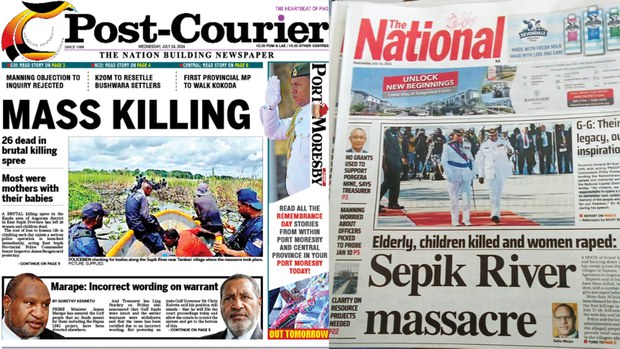Dozens feared raped, killed in Papua New Guinea massacre
2024.07.24
Port Moresby/Brisbane
 Front pages of Papua New Guinea's national newspapers Post Courier and The National on July 24, 2024.
Front pages of Papua New Guinea's national newspapers Post Courier and The National on July 24, 2024.
Women and girls were reportedly raped and among more than two dozen people killed during days of violence in Papua New Guinea’s north-west.
Front pages on both of the country’s daily papers report the massacre began on July 17 in a remote area on the Sepik River and continued for several days from village to village.
Deadly clashes between tribes regularly occur in the Pacific island nation of about 12 million people, including 49 killed in February in the mountainous Highlands. At least 16 people died in rioting in the capital Port Moresby a month earlier.
The Post Courier newspaper quoted East Sepik Provincial Police Commander Senior Inspector James Baugen as saying that a number of decapitated women were among at least 26 dead.
“Most of those that were killed were breastfeeding babies and young children with their mothers,” Baugen reportedly said.
“The crime scene is rotting with dead bodies. Some of the bodies were seen floating down the Sepik River and taken by crocodiles.”
Speaking to the National Broadcasting Corporation provincial radio station NBC Wewak, Baugen said the killings were ignited by unresolved ongoing conflict between three villages.
He confirmed eight adults and 18 children died.
The National newspaper reported a number of women and girls were raped before being killed
Tamara village near the town of Angoram in East Sepik Province came under attack first, with 32 houses torched, followed by Tambari and Agrumara, by a group estimated to number 30 youths.
Those responsible remain at-large and survivors have sought shelter in Angoram
Local member of parliament Salio Waipo in a statement called for calm and said he is in talks with the country’s police commander David Manning to deploy officers to end the violence.
Waipo said police would need to clear and secure the “killing zone” before help could be sent to the villagers.
United Nations Resident Coordinator in Papua New Guinea Richard Howard in a social media post condemned the “brutal slaughter” and called for “a swift and thorough investigation and justice.”
Papua New Guinea has one police officer for about every 1,800 people, nearly four times less than the level recommended by the United Nations to ensure law and order, according to a Griffith Asia Institute report released last year.
The ratio of police to people has declined substantially in the past half century since independence in 1975, as Papua New Guinea’s population more than tripled.
Many remote and inaccessible areas in the country have been largely outside central government control for decades.







